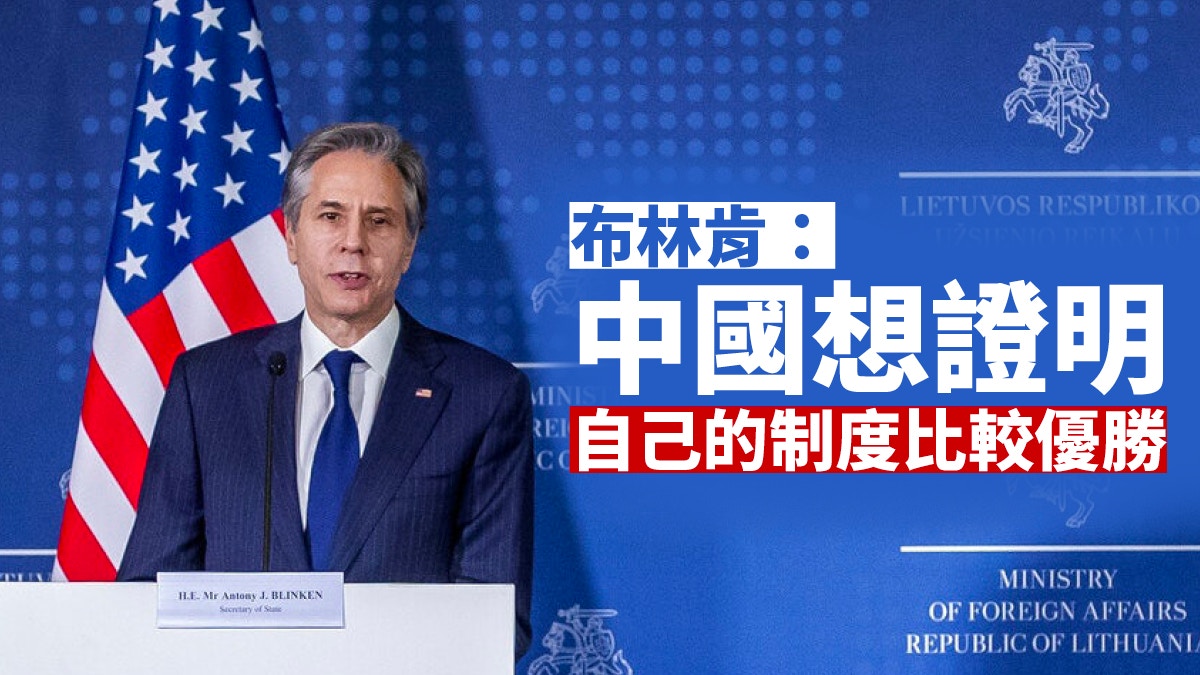Last Thursday (May 26), U.S. Secretary of State Antony Blinken delivered an important speech on the Biden administration's China strategy. While reiterating the Biden administration's rhetoric of "not seeking a new Cold War and conflict," he affirmed China's past. Years of economic development achievements - from the widespread poverty 50 years ago to today's powerhouse with modern cities and infrastructure; while continuing to spread the China threat theory, criticizing China's both intentions and ability to destroy the world built after World War II order and values.
In the end, he claimed that all the United States did was not to stop China's development, nor to change China's system, but to "prove once again that democratic institutions can meet pressing challenges, create opportunities, and enhance human dignity."
Compared with the "New Iron Curtain Speech" delivered by Trump-era US Secretary of State Mike Pompeo in July 2020, the content of Blinken's speech appears "softer".
He not only praised the industriousness of the Chinese people, but also pointed out that the United States does not want to stop China's development, but just wants to prove that its own system is also very good.
On the surface, this speech seems to want to show how objective and rational the United States is, and the Sino-US relationship does not feel too bad.
However, when we look at this speech from historical experience, we will find that its content is stripped of history. At most, it can only be regarded as a propaganda draft of the United States, and it can be said to have no effect on our understanding of the reality of Sino-US relations.
America's Self-Talking Policy Statement
We really cannot say whether the United States does not pursue a new Cold War as Blinken said, but if another so-called Western democratic country is as powerful as the United States, it may not be willing to accept that this is the victory of the democratic system.
The suppression of Japan by the United States in the 1980s just shows that the confrontation between China and the United States is not at all a confrontation between the two systems that Blinken called.
Japan began to rise from the 1960s to the 1970s. In the 1980s, its technology and national strength once approached the United States, and its exports to the United States continued to increase, which brought the American industry into a trough.
At that time, there was anxiety in the United States, especially the semiconductor industry, which was regarded as a rising star, could hardly compete with Japanese companies, which eventually caused Washington to suppress Japan in many ways.
The United States coerced Japan by increasing tariffs, anti-dumping and other trade means, first forcing Japan to sign the famous "Plaza Agreement" in 1985 to force the appreciation of the yen to suppress Japanese exports, and then signing the "US-Japan Semiconductor Agreement" in 1989 to force Japanese semiconductor companies to open up Patents and guaranteed market share for foreign companies.
Japan is an ally of what the U.S. so-called "shares the same values", but once its position is threatened, the U.S. does not hesitate to suppress it to ensure that it continues to have the upper hand over world development.
Compared with Pompeo, the US Secretary of State in the Trump era, the content of Blinken's speech seems "gentle", but the content is actually stripped of history and can only be regarded as a propaganda draft of the United States.
(Associated Press)
Blinken said the post-World War II "rules-based international order" was based on the UN Charter, including self-determination, sovereignty, and peaceful resolution of disputes, and China "is undermining that order."
However, who in the end does not respect the principle of sovereignty and makes trouble with China on the Taiwan issue all day long?
Who the hell started war after war after World War II, causing the lives of civilians in many countries to be devastated but unable to solve any problems, and even created the chaos of withdrawing troops from Afghanistan in anger?
The Secretary of State of such a country now accuses China of undermining peace and order. Can we believe that what the United States is doing against China is just to demonstrate the advantages of the democratic system?
To truly understand the nature of the Sino-American rivalry, we cannot separate from history.
Graham T. Allison, an American political scientist, once summed up the theory of "Thucydides Trap" from the relationship between new powers and old powers during the rise of emerging powers many times in history.
Its name comes from the historical example of Sparta, the representative of the old hegemony in ancient Greece, who did not hesitate to wage war in order to suppress the emerging power Athens.
Allison pointed out that in order to maintain their advantages in history, the old forces will always resort to various methods to suppress the emerging forces, and there is a very high chance that a war will be triggered.
In his view, the essence of Sino-US wrestling is a war of national interests for international influence and superiority, rather than a war of democracy and autocracy.
Problems cannot be understood without history
Although the US-China wrestling declaration is drawn from history, there are still many Hong Kong people who accept this "democracy versus totalitarianism" argument, ignoring the nature of the interests that lead to the wrestling.
As a result, some people have the idea that Hong Kong must make a choice between China and the West, totalitarianism and democracy, and even propose that "Hong Kong is the bridgehead of the West in China" or "Hong Kong is a member of the West".
Many Hong Kong people accept this kind of "democracy versus totalitarianism" argument, which is very frowned upon.
The picture shows that in the past social movements, many people waved the British flag of Hong Kong and the United States.
(File photo/Photo by Lu Yiming)
To truly understand the relationship between China and the US and Hong Kong's role in this wrestling, we cannot ignore the historical context.
Hong Kong has a rather unique historical background. It is a colony ceded from China and managed by the West for more than a century, which gives Hong Kong people a unique understanding and position of their own identity.
Documents from the colonial government reflected that the British side deliberately emphasized in Hong Kong’s history education that Hong Kong people have Chinese ancestry and paid attention to cultivating their sense of identity with Chinese culture. This vast population "pays the bill"; at the same time, it has to carefully avoid criticizing imperialism and colonialism, which has made Hong Kong society's understanding of China's suffering in the past century obscured, and tried its best to prevent Hong Kong people from caring about China's current affairs. , worried that excessive enthusiasm for politics would jeopardize the rule and stability of the colonies.
As a result, history education in Hong Kong is very different from the history education in other places, and it looks at the situation in China and the world in the 20th century from the perspective of the West.
This ingenious design has caused Hong Kong people to lack a sense of identity for a long time.
After the handover, Hong Kong was freed from the shackles of the colonies. Hong Kong people realized the gap in their sense of identity and began to hunger for answers. However, as the contradiction between the land and Hong Kong deepened, a biased local trend of thought began to emerge.
At a time when Hong Kong was in the midst of an identity struggle, the deteriorating Sino-US relationship was an unexpected catalyst.
In the absence of a sense of history, some Hong Kongers have accepted Western narratives that describe the Sino-US wrestling as "democracy versus totalitarianism," and use binary opposition thinking to determine that Hong Kong has to choose between China and the West, totalitarianism and democracy.
The so-called "Hong Kong is the bridgehead of the West in China" or "Hong Kong is a member of the West" came into being.
This kind of thinking distinguishes Hong Kong from China and indirectly becomes a breeding ground for the "Hong Kong independence" trend.
However, as mentioned above in Allison's "Thucydides Trap", the Sino-US wrestling is not a confrontation between democracy and totalitarianism, but a typical competition of interests.
In fact, Hong Kong has never had to choose between binary oppositions.
The fact that Hong Kong is China's territory is unshakable, and the interests of Hong Kong and mainland China are highly bound.
Although Blinken said that the United States does not intend to hinder China's development, in practical actions, the United States is doing everything possible to suppress China in order to maintain its competitive advantage over China.
In this process, Hong Kong, with its special historical background, has naturally become the entry point for the West to attack China.
Hong Kong, with its special historical background, is quite a natural entry point for the West to attack China.
(File photo/Photo by Zhang Haowei)
Hong Kong people should realize that no matter whether Hong Kong is democratic or not, the West will use the "Hong Kong card" as a means to attack China.
Confined to the Western ideological binary opposition, it will only make people unable to recognize their own environment, let alone get out of the predicament.
Hong Kong people must recognize the nature of Hong Kong's international status and its position in the Sino-US wrestling, and realize that political ideology is not the real core of the problem, and it is not worth our time to continue to waste time here.
From historical experience, we will also find that the struggle between great powers is not eternal, and Sparta and Athens eventually reached a certain balance.
The pattern of Sino-US wrestling will change over time, and Hong Kong's situation will also change accordingly. Today's predicament may become an advantage in the future.
If the time comes, will Hong Kong itself have the ability to seize the opportunity?
For Hong Kong today, the most important international vision is how to continuously enhance its competitiveness through upgrading and reform to strengthen its value and adapt to various changes in a chaotic situation.
This is also what is said in "Sun Tzu's Art of War", "There is a lot of chaos, and there is chaos in the fight, but it cannot be disordered. It is chaotic and chaotic, and it is round and invincible."
A well-structured Hong Kong ruler must consider enhancing the strength and importance of Hong Kong in key areas of development in the new era, such as industrial chain, technology research and development, and regional exchanges, so as to achieve "self-preservation and complete victory".



/cloudfront-eu-central-1.images.arcpublishing.com/prisa/3I74UEXLYRBBRPGPSGWNN6WXH4.jpg)









